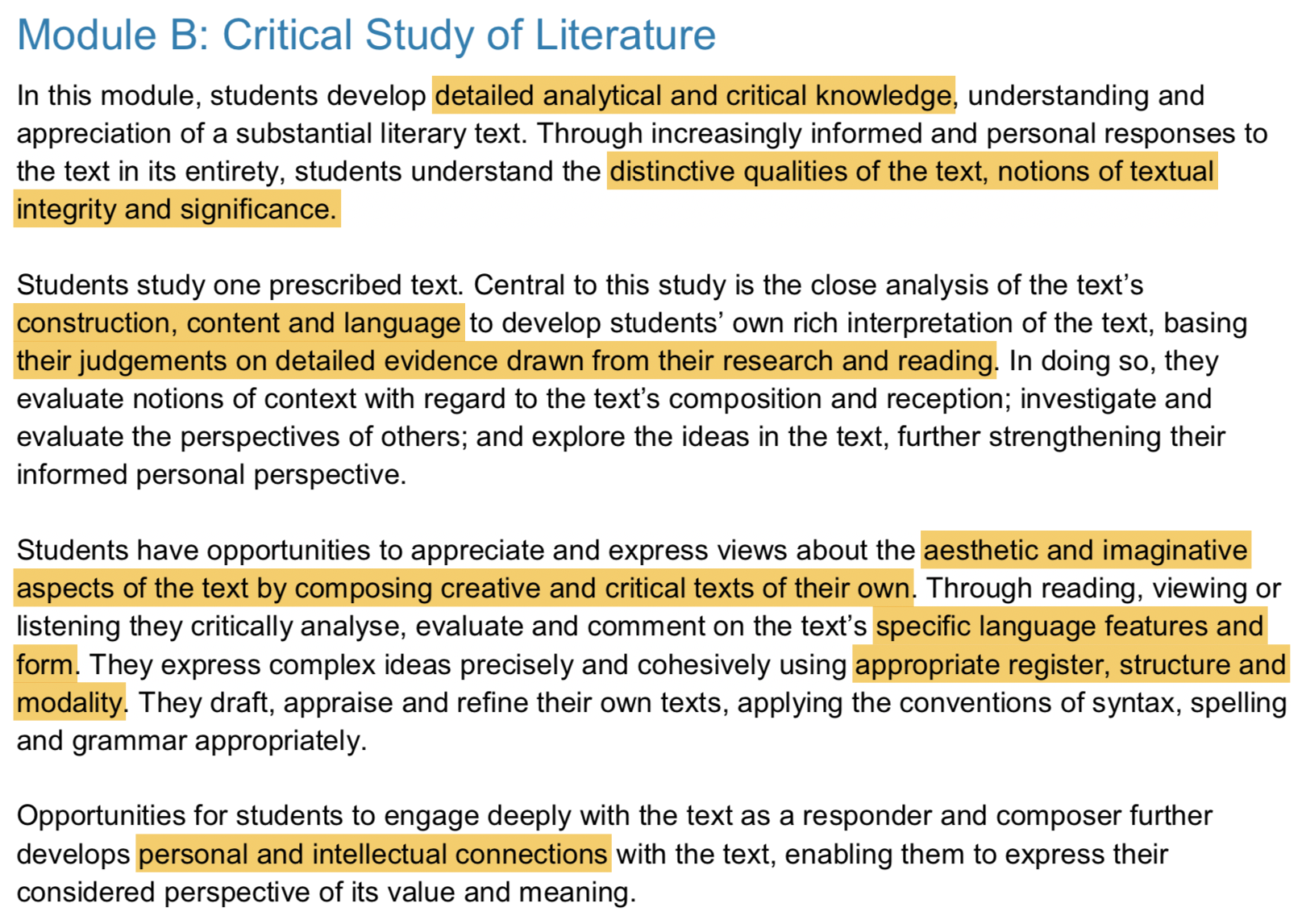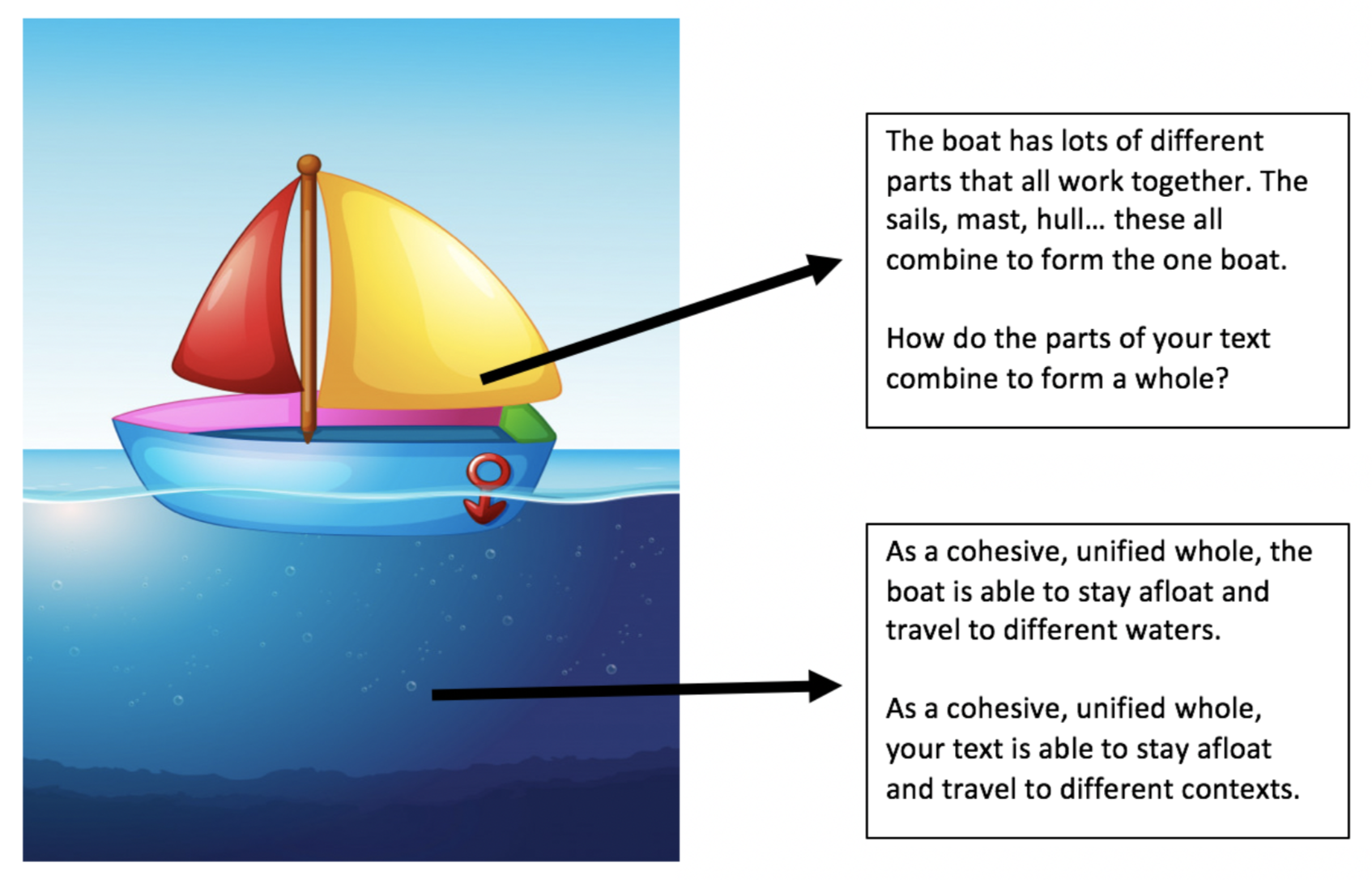
As you should know by now, NESA has overhauled the old HSC English syllabus, to include HSC Advanced English Module B: Critical Study of Literature.
If you have no idea what this module is about, don’t fret! You’ve come to the right place!
In this article, we’ll walk you through the new changes to the syllabus, debunk what the module is all about, as well as how to get a Band 6 in Critical Study of Literature!
So, what are you waiting for? Let’s jump in!
What are the changes to HSC Advanced English Module B?
What is Module B: Critical Study of Literature all about?
How do I develop a personal interpretation of a text?
How do I get a Band 6 in HSC Advanced English Module B?
What are the changes to HSC Advanced English Module B: Critical Study of Literature?
Changes to the Number and Value of Assessment Tasks
NESA has set firmer rules about how schools can assess you in HSC English:
- There will be THREE assessment tasks set in Year 11
- Each task can only weigh between 20-40%
- Schools can only set ONE formal exam during the year
This is good news, because it means the number and type of assessments that students across NSW are given are relatively similar. In other words, this means there will be less variation in assessments between schools.
While there are some substantial changes to the structure of the new Module B, the skills you need to cultivate in this Module are very similar to the old Module B.
As such, you’re likely to be assessed in a similar manner to the old Module B, in an essay form. However, this is up to your teacher, so pay attention when they’re teaching you skills in responding to texts!
Wait up! We’ve put together a week-by-week guide to the second term of Year 12 for you with essential resources on major works, summary articles on Mod A and B texts, procrastination tips, note-taking structures, and more!
Critical and Creative Responses
In the old Module B, students were required to respond to texts imaginatively, effectively and creatively.
In the new Year 12 Module B Critical Study of Literature, students need to respond critically and creatively, and by doing so, analyse and assess the way meaning is shaped and conveyed in the text.
Personal and Intellectual Connections to the Text
Another change in the module is that students are now expected to develop personal and intellectual connections to the text through study of this Module.
By reading, analysing and responding critically and creatively to your text, you should develop an appreciation and personal relationship to the text and its themes and ideas.
Further to this, students should be able to express their personal interpretation of the meaning of the text in an appropriate, clear and cohesive manner. In terms of intellectual connections, this refers to the way that literature changes how you think about the world.
No matter what manner you’re responding to the text in, you should always be doing this with proper register, structure and modality and pay close attention to details like spelling and grammar.
What is Module B: Critical Study of Literature all about?
To start off, let’s take a look at the rubric.

As you read through the rubric, take note of the highlighted words and phrases – what might they mean in the context of this module?
You can likely observe some trends in the highlighted words and phrases. Within Critical Study of Literature, there is a large focus on developing a personal and intellectual response to the ideas, construction and language of a text.
You’ll also be considering your personal response in light of both others’ personal responses over time, and also the enduring relevance of the text.
Critical in this sense refers to the way you will be developing your own response to the text, with a focus on evaluation and understanding of how the text’s different elements work together as a whole.
So let’s break down the rubric in even more depth the help you figure out how to get that Band 6!
“…students develop detailed analytical and critical knowledge, understanding and appreciation of a substantial literary text”
At the heart of this module is the (surprise!) critical study of one text (or a collection of texts by one composer). The set texts for the new Module B are considered substantial literary texts, meaning they have special significance in literature, for a variety of reasons.
In Module B you’re required to develop a thorough understanding of your text and it’s significance. Because the set texts for Module B are “substantial literary texts”, they might be a challenge to read and understand at first.
Therefore, to develop a detailed analytical and critical knowledge, understanding and appreciation of the text, you will need to likely read it more than once.
“through increasingly informed and personal responses to the text […] students understand the distinctive qualities of the text, notions of textual integrity and significance”
In Module B, you won’t just be studying particular parts of the text, but the text as a cohesive whole. What’s more, it’s important that when you revisit your text, you gain an increasingly informed and personal response.
This is useful as it allows you to think about and understand how the text as a whole is constructed, using structure, plot, characters, literary techniques, but most importantly textual integrity (which we get in to later on in this article – stay tuned!).
“close analysis of the text’s construction, content and language [is central] to develop students’ own rich interpretation of the text, basing judgements on detailed evidence drawn from their research and reading”
When responding critically to your text, it’s important for you to be using detailed evidence that you find through research and further reading. This means you’re required to go above and beyond the text itself, the readings your teacher gives you, and that you do your own independent research about your text.
We’ll explore what a texts’ construction, content and language is later on in this article!
“students have opportunities to appreciate and express views about the aesthetic and imaginative aspects of the text by composing creative and critical texts of their own […] using appropriate register, structure and modality”
In the new Module B, students need to respond critically and creatively, and by doing so, are able to express views about the text, how the composer conveys meaning through language, and whether they are successful in doing so.
You can be assessed in a variety of new ways in the new Module B. This might be an essay, a creative reimagining of your text, a multimodal response, or something else! It’s up to your teacher.
“opportunities for students to engage deeply with the text as a responder and composer further develops personal and intellectual connections with the text”
This is the big one.
Reading the text once and simply regurgitating arguments you found on the internet is not going to be enough for Module B. Well, at least, not enough for you to do well in HSC Advanced English Module B.
The aim of Module B is for you to develop a genuine connection to the text and have your own personal interpretation and response to the text.
This isn’t something that’s teachable, but comes from genuine connection with and reflection on your response to the text, it’s meaning and significance.
In Summary:
HSC Advanced English Module B requires you to understand the construction, content and language of a text in developing your own personal interpretation. You will also consider your personal interpretation in light of other personal and intellectual interpretations and will explore the enduring relevance of the text over differing contexts.
The study of this module will culminate in you composing creative and/or critical responses to the text, in light of the elements mentioned previously.
Wondering how to ace the new HSC English Syllabus?
Debunking Key Terms from HSC Advanced English Module B: Critical Study of Literature
Understanding these terms is essential to understanding Module B.
Construction
Also known as textual form, construction refers to the way a text is – you guessed it – constructed.
You will consider elements such as the medium of the text (text type), the structure of the text and also the genre of the text. As you move through this module, you’ll quickly realise that how things are said is just as important as what things are said.
Content
Refers to the key attitudes and values of the text. Try to move beyond using the word “theme” – you’re no longer in Year 7-10. As you identify key attitudes and values in your text, also try and avoid using only one word to describe them.
For example in the T.S. Eliot poems prescribed, “alienation” is not a key attitude or value.
You need to extend this theme further, beyond being simply one word – think about what message the composer is trying to convey about this aspect of subject matter. Are they trying to get a particular point across?
Language
Ahh, language techniques. The bread and butter of high school English.
Similarly to construction, understanding the language techniques used in a text helps you to understand how attitudes and values are conveyed and adds a much deeper level of meaning to your personal interpretation of the text.
When thinking – and writing – about language techniques in your text however, don’t simply provide a shopping list and identify them only for the sake of identifying them. That’s boring and has no relevance to the judgement you ultimately want to be making about the significance of your text over time.
When considering language techniques in your text, consider the following:
- What technique has been used?
- What is the effect of this technique?
- Why use this particular technique over others? For example, why would a composer use a metaphor when hyperbole could do the job just as well? What does that metaphor bring to the line that other techniques wouldn’t?
And context? What’s that all about?
You should hopefully already be familiar with the concept of context from your previous studies in English.
Context in Module B refers to notions of time, place, society, culture and politics:
- How have these affected the construction of your text by its composer?
- How have they affected the way others (and yourself) have interpreted this text over time?
Understanding the relevance, or lack thereof, of your text across differing historical, cultural, social and political contexts is crucial to success in Module B.
For instance, to return to our Eliot example, the sad nature of many of the poems makes much more sense in light of the enormous changes to life that the poet was reacting to.
How can I develop a personal interpretation?
Have an opinion about the text and stick to it.
If you love the text (or can at least tolerate it the most out of all your English texts), think about why that is.
What compels you to enjoy this text? What might others enjoy about this text? What stands out to you? Why? This is where you will want to consider the role of construction, content, language and context in developing a personal response to the text.
On the other hand if you hate the text or are finding it a little boring, use this to your advantage!
Why has the text failed to engage you, a reader in the 21st century? Use this hatred or lack of connection with the text to consider the limitations of its construction, content, language and contextual links.
And what on earth is “textual integrity”?
Textual integrity is a term that has tripped up even the best Year 12 students so it’s good to get a handle on it now.
There are two parts to the definition of textual integrity:
- How all the different elements of the text come together to create a cohesive whole. In other words, how is unity created in the text? What remains consistent?
- How the text has remained enduringly relevant across different contexts. For example, why do we still care about the poetry of T.S. Eliot today even though it was written more than a century ago?
We can consider textual integrity as being like a boat:

How Do I Get a Band 6 in HSC Advanced English Module B?
Step 1: First things first, read your text!
Teachers can tell when you haven’t read your text and believe me, it really comes across in your writing. As the focus of the module is for you to develop your own authentic, personal interpretation of the text, you do not want to be faking it.
Relying on Sparknotes is not enough and will get you perhaps a C-range response at most (yikes). It is extremely difficult to form a genuine, sophisticated judgement on something you haven’t even read.
Once you’ve read your text and as you read through it in class, take regular notes. Here at Art of Smart we often recommend the humble TEE table as a tried and tested way to compile effective notes for English.
|
TECHNIQUE |
EXAMPLE |
EFFECT |
|
What technique has been used? |
Provide a quote. |
What’s the meaning behind this quote? What’s the effect of the technique in revealing character/plot? Why use this technique in particular? |
For HSC Advanced English Module B however, as a large focus is placed on understanding how key ideas/attitudes/values have been conveyed, we can modify the TEE table as such:
|
ATTITUDE |
TECHNIQUE |
EXAMPLE |
EFFECT |
|
What key attitude/value/s from the text are relevant here? |
What technique has been used? |
Provide a quote. |
What’s the meaning behind this quote? What’s the effect of the technique in revealing character/plot? Why use this technique in particular? |
This helps to better organise your notes as you can coordinate them by attitude/value.
You may choose to have one giant table for the whole text (not recommended) or separate tables for each section (recommended). You can have separate tables for each attitude/value however as there is often some overlap, this might get a little messy.
Try your best to stay up to date with your TEE table and add to it as you move through the text, whether on your own or in class. If you’re lucky, your teacher may even have you create one as part of your classwork.
Check out this awesome article on constructing your own TEE Tables in this article!
What’s next? Surely there’s more to it than just a TEE table?
After you have created and understood your TEE table, it’s time to consolidate this knowledge and move into writing.
Chances are, you will be writing an essay (or some other form of analytical writing) as assessment for Module B.
Are you having to write a feature article for English at the moment? Look no further than our incredible guide!
Get your hands on some practice questions and get writing! If you’re lucky your teacher may provide you with some however if not, we’ve got you covered.
Make sure to check out this awesome guide on how to write a Band 6 HSC English Essay from our expert, Madison!
Looking for a tutor to support you while you ace HSC Advanced English Module B?
We pride ourselves on our inspirational coaches and mentors!
We offer tutoring and mentoring for Years K-12 in a variety of subjects, with personalised lessons conducted one-on-one in your home or at our state of the art campus in Hornsby!
In Year 11 preparing for the leap to Year 12? Take this quiz to find out how ready you are!
To find out more and get started with an inspirational tutor and mentor get in touch today!
Give us a ring on 1300 267 888, email us at [email protected] or check us out on TikTok!
Cameron Croese is a qualified English teacher, who has a Bachelor of Education (Secondary) / Bachelor of Arts (English) from Macquarie University and is currently undertaking a Masters of Education in Melbourne. A long-time Art of Smart coach, Cameron has supported over 60 students from Years 7 to 12! When not studying, Cameron is an avid writer, having won several awards for short stories, including the Alan Marshall Short Story Award.


